'No presents, no heating - but it was the best Christmas we ever had'
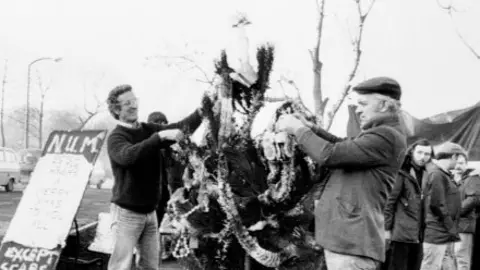 PA Media
PA Media"It was the best Christmas we ever had," says Aggie Currie without hesitation. "And a lot of mining families would say the same."
The Miners' Strike had been ongoing for nine months by the time Christmas 1984 came round.
And as Wham! and Band Aid battled to top the UK's festive charts, one of the country's most bitter and long-running industrial disputes was deadlocked.
Across the north of England striking miners and their families were facing a December like no other.
Aggie's husband Pete had, like his colleagues, walked out of Markham Main Pit in Doncaster in March 1984 and, barring picketing, had not been back since.
Living off just £22.50 a week, as well as the generosity of their community and Good Samaritans, the couple had to tell their two children, Vicky and Peter, that there would be no presents for them that year.
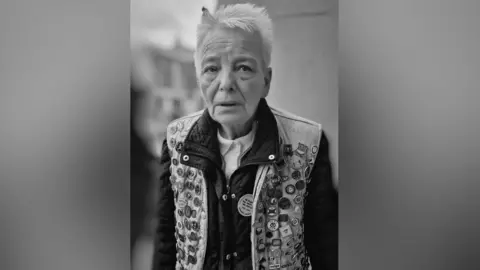 Aggie Currie
Aggie Currie"You made the most of what you had," says Aggie, 74, who has been married to Pete for 52 years.
"We weren't worried about Christmas presents because everyone was in the same boat.
"You didn't have kids saying to other kids, 'What did you get?' because none of them had anything. It's different now."
While Vicky, who was 10 at the time, "understood" the absence of gifts, Peter, who was a year younger, had more difficulty grasping the concept.
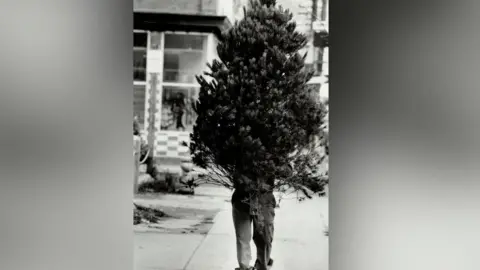 Getty Images
Getty ImagesSome 24 miles north, another young couple were facing hardship.
Shaun McLoughlin, who was 23 and employed at Kellingley Colliery in North Yorkshire, was supplementing his income with odd jobs on building sites.
While his wife Denise had been able to contribute financially until September 1984, a major operation in hospital had left her unable to work.
"It was a real struggle," says Shaun, who is now the mine director at the National Coal Mining Museum in Wakefield.
"Coming up to winter, one of the things I remember was my house had a coal fire.
"We had no coal and we had no money to pay for coal.
"My dad was a mine official and still got a coal allowance, so he helped us out as best he could.
"I remember we didn't bother with a Christmas tree. It was something that you didn't want to waste your money on."
Meanwhile, in County Durham, photographer Keith Pattison was chronicling the strike in the pit village of Easington, having earned the trust of a community that felt stung by national media coverage of the dispute.
He remembers a collective attitude of "Can we get through Christmas?", despite sensing the fatigue of nine months without regular income for mining families.
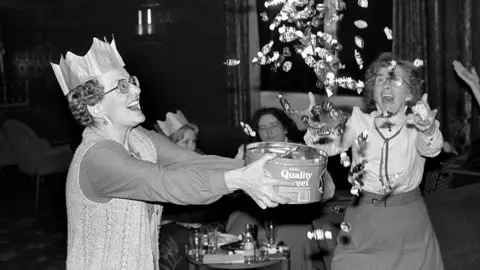 Keith Pattison
Keith Pattison"It was quite extraordinary," says Keith, who later co-authored a book about the strike in Easington with The Damned United author David Peace.
"There was a buzz and a party atmosphere. But in some of the pictures I took there's a resigned weariness and a sense of 'How do we keep cheerful?'
"There was a determination that no-one would be starved back to work."
Back in South Yorkshire, while Aggie might have been reconciled to no presents, Christmas without a Christmas tree proved a bridge too far.
"I was absolutely gutted my kids weren't going to have one", she recalls.
"I went upstairs so the kids wouldn't see me crying and I looked out the window and saw my neighbours had a nice fern tree in the middle of the garden.
"At 02:00 GMT I went and cut it down and brought it back and that was the tree.
"I'm sure the neighbours knew it was me but they never said anything."
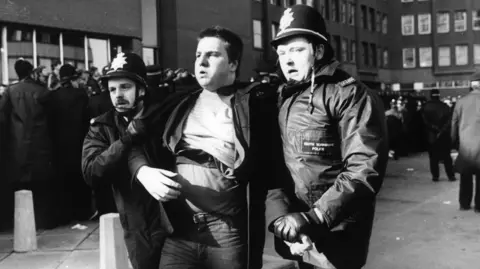 MirrorPix/Getty Images
MirrorPix/Getty ImagesThe National Union of Mineworkers (NUM) paid for a chicken for Aggie's family to eat on Christmas Day, as it did for many other families.
But even nine months in, when it was suggested to her that the "best thing to do" would be for Pete to return to work, Aggie said she would "break his legs" before he did that.
"I would never cross that picket line for love nor money," says Aggie, who was arrested multiple times by the police at demonstrations during the strike.
Shaun similarly remembers the mood around the striking miners remaining "steadfast" that December, even though some had trickled back to work.
"We were hoping and hoping for a really harsh winter, because that would have put severe demand on the energy companies," he recalls.
"The mining community were thinking back to 1974 when we had the blackouts (after a strike then led to energy shortages and the three-day working week).
"But it never happened. It was quite mild in the end."
Shaun and his wife spent Christmas Day at his parents' home, alongside his brother, also a miner, and sister-in-law.
A turkey and sprouts dinner was a welcome relief from "sandwiches or soup" which had become the norm at home.
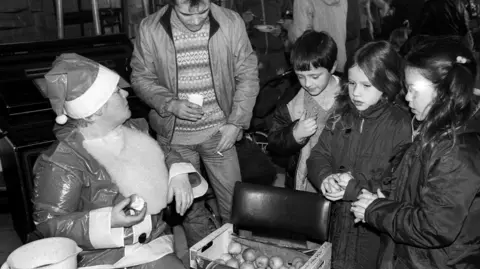 Keith Pattison
Keith PattisonMeanwhile Aggie and Peter broke with their New Year's Eve tradition of "heading down the club" for a drink - a relatively big deal for two people who had been born in Scotland.
"Our parents used to say Christmas is for the kids and New Year is for us," Aggie says. "But we had no money that year."
The strike continued for another three months until the miners returned to work.
"It ended very quickly," Shaun says.
"I felt deflated in one sense and happy in another that it was over."
A poem later written by Aggie's daughter Vicky read: "Oh Maggie didn't you know, You've made my mam strong, Something we never knew, She'll stand up to your boot boys."
"I still can't read it without crying," Aggie says.
She recalls her whole family helping to spearhead the march back to the pit almost a year after the strike first started.
"It was a great day, but a sad day," she concludes.
In Easington, Keith says he remembers feeling like the outcome of the dispute had become "inevitable" by the new year.
"The writing was on the wall by then," he says.
"It was obvious by then the government would use every resource available and that money was no object to crushing the dispute.
"But the key takeaway for me, when I still speak to those affected now, is that they'd do it all again.
"That's not the case for everybody, but it is for a lot of them."
Listen to highlights from South Yorkshire on BBC Sounds, catch up with the latest episode of Look North or tell us a story you think we should be covering here.
